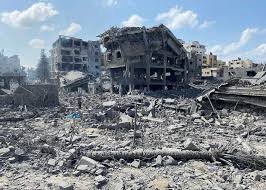Israeli army inflicts $50bn worth of damage to Gaza
UN assessment reveals scale of destruction in the enclave

TEHRAN- Research by the United Nations has offered a shocking depiction of how little civilian infrastructure in the Gaza Strip has been spared from Israeli bombardments.
A joint assessment conducted by the United Nations Development Program (UNDP) and the United Nations Economic and Social Commission for Western Asia (ESCWA) says the scale of destruction caused by the Israeli occupation forces in Gaza is “unprecedented” and something not been seen since the Second World War.
Speaking via teleconference to reporters at the UN Headquarters in New York, Abdallah Al Dardari, Director of the Regional Bureau for Arab States for the UNDP, explained how much development in the Gaza Strip and the occupied West Bank as well as al-Quds (Jerusalem) has regressed as a result of Israeli military attacks over the past seven months.
“For Gaza alone, it has regressed by more than 40 years. We are back in the 80s almost for Gaza … 40 years have been wiped out,” Dardari underlined.
“When we say Human Development Index regressed by 40 years, we are talking about all the gains in schools, in years of schooling, in educational attainment, in health, in life expectancy at birth, and GNP per capita, having regressed to those levels of the 1980s.”
The estimate, he says, is that “an investment of $50 billion” has been lost.
The Israeli military has been pounding the Gaza Strip relentlessly daily for the past seven months, killing around 35,000 Palestinians, most of them women and children. More than 75,000 others have been injured, many in critical condition.
The UN estimates that at least 10,000 Palestinians are also missing, presumably dead under the rubble of residential zones that have been flattened.
According to the UNDP, as of April 12, Israeli occupation forces had killed or injured five percent of Gaza’s population.
The UN agency says no form of normalcy can be restored to Gaza without removing “37 million tons of debris” to allow space for temporary shelters and to establish other vital structures.
“72 percent of all housing in Gaza has been destroyed,” the research found.
Dardari also spoke of significant damage to “all other commercial and other buildings” that have been razed to the ground by Israeli forces.
“This is unprecedented. And we haven’t seen anything like this since 1945, since the Second World War, that intensity in such a short time. And the massive scale of destruction,” he lamented.
“You have 2 million people stranded without services. It’s unfair, it’s inhumane if we just abandon the people and wait,” the UNDP has warned.
An initial joint assessment by the UNDP and ESCWA was released in November 2023 in which they estimated the impacts of the war on the State of Palestine, including the Gaza Strip.
The newly updated research estimates the impacts of the Israeli war at six months, with very bleak projections and scenarios inside Gaza over the next three months.
Despite grave concerns over the humanitarian toll, Israeli Prime Minister Benjamin Netanyahu has vowed to invade Rafah (the last refuge in the Strip where Israeli ground forces have not entered) regardless of whether a deal on prisoner exchange is reached or not.
More than one million Palestinians have sought shelter in Rafah with nowhere else to flee if Israeli forces raid the southernmost Gazan city.
Israel’s closest ally, the United States, has acknowledged it has not received or seen any Israeli plans to ensure the safety of civilians in Rafah if Israeli troops enter.
International humanitarian agencies have pleaded with Tel Aviv to end its devastating bombardment of Gaza immediately, warning the regime would be committing more war crimes the longer it goes ahead with its indiscriminate strikes on people from air, land, and sea.
“Every additional day that this war continues is exacting huge and compounding costs to Gazans and all Palestinians, now and in the medium and long term,” the UNDP Administrator, Achim Steiner, has said.
Compared to the UNDP’s preliminary research about one month after the war on Gaza began, the latest data by the UN agency warns that Palestinian suffering in Gaza will not end when the U.S.-backed Israeli war on the besieged territory does.
Leave a Comment